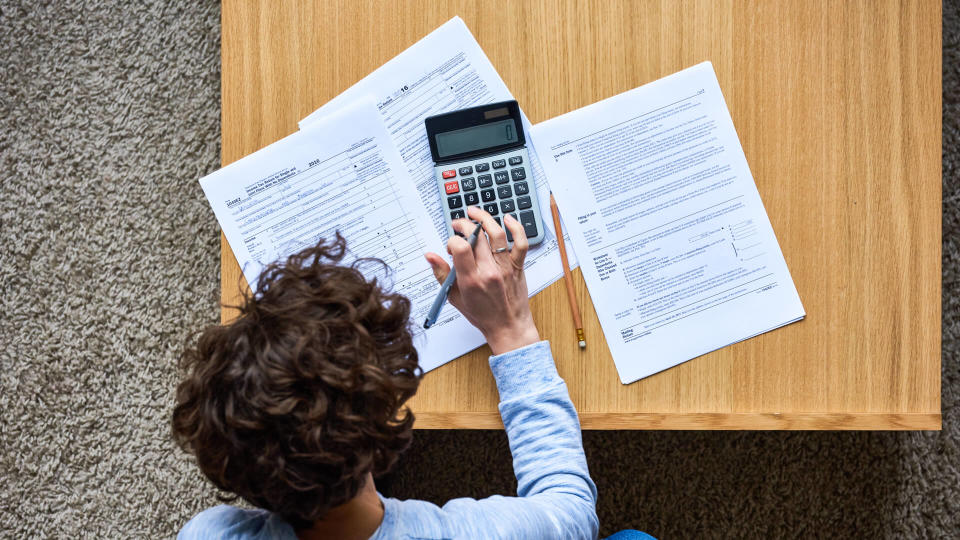What Actually Happens If You Don’t Pay Your Taxes

As a tax attorney, Danielle Dryden has seen it all. That is, she’s seen all sorts of situations where people haven’t paid their taxes and they’ve owed amounts ranging from thousands to millions of dollars. “When I started in this industry, I never in my wildest dreams imagined 95% of the scenarios I’ve seen,” said Dryden, who is the owner of Dryden Tax Resolution in Tampa, Florida.
Find Out: All the New Numbers You Need To Know for Planning Ahead on Taxes
Fortunately, the IRS offers a variety of ways for taxpayers to pay what they owe, she said. “I find there are very few people that end up in an unmanageable repayment agreement,” Dryden said. “In the same vein, the IRS also does a number of things to protect their ability to collect on the debt should things go awry with the taxpayer. These include liens, levies, and, in extreme circumstances, the seizure of physical property.”
Here are a few real-life scenarios of what happened to people who didn’t pay their taxes.
Last updated: Jan. 26, 2021

A Retiree Made an Early Retirement Account Withdrawal
Dryden had a client in his 50s who had retired early and decided to withdraw $100,000 from his IRA to buy a home. However, the sale fell through. So he put the money back in his IRA — but he triggered a tax bill in the process.
Learn More: Most Popular Things To Do With Your Tax Refund — and How To Do It Smarter

What Happened Next
Dryden’s client returned the $100,000 to his IRA 61 days after withdrawing it. If he had put the money back in just one day earlier, he would’ve avoided a tax bill. Instead, it was treated as an early withdrawal and subject to a 10% tax because he was younger than 59 1/2 when he took the money out of his IRA. As a result, he owed about $30,000, Dryden said.
Know: How To Use Your IRA as a Last-Minute Tax Deduction

How It Was Resolved
Because Dryden’s client had put the money back into his account, he couldn’t afford the $30,000 tax bill. To pay it, he would’ve had to withdraw money again from his IRA — and get hit with another early withdrawal penalty.
So, Dryden wrote a letter on behalf of her client to the IRS explaining the situation where he didn’t get his money back from the failed home purchase until 61 days after he withdrew it. “I also just straight up begged for mercy,” she said. And it worked. “The IRS agreed to remove the tax and eliminate the taxable event,” she said.
Dryden said the IRS has a number of scenarios where its computer system doesn’t allow any leeway. But when you write a letter, an actual person will read the request and make a decision. “I see that go in favor of the taxpayer 50% of the time,” she said.
Need To Know: How To Protect Your Tax Refund From Being Stolen

A Man Let Debt Payments Take Precedence Over Tax Payments
Several years ago when Steven was deep in debt, he got a surprise when he filled out his tax return. He discovered that he owed about $300. It wasn’t a large amount, but he didn’t have the cash to pay what he owed because he owed so much to creditors at the time. So Steven didn’t pay his tax bill.
Learn: How To Pay Off Back Taxes

What Happened Next
Steven discovered that he couldn’t hide from his tax debt. “I received a letter letting me know that I owed $300 and that I would need to pay this balance by a certain date with the accrued interest,” he said.
If you file a tax return but do not pay, there are penalties for not paying your taxes. You will be charged a 0.5% penalty on what you owe each month until you pay in full. You also have to pay interest on top of the penalties you pay. It starts accumulating on the tax filing deadline and accumulates daily. The rate is determined every three months. Recently, it was 5%.
Find Out: 9 Legal Tax Shelters To Protect Your Money

How It Was Resolved
Steven remembers the interest rate the IRS was charging him was about 3% to 5%. Because it was lower than the interest rate he was paying on his credit card debt, he didn’t pay back his tax debt immediately. “While it’s a major risk to not pay back your IRS debt, I had every intention of paying it back — just at a later time,” he said. “It also gave me time to set aside the amount due.” He did pay what he owed. Fortunately, because the original balance was relatively low, he still ended up paying less than $400 with interest and fees.
See How: The 11 Craziest Ways People Have Legally Avoided Paying Taxes

A New Mom Missed a Filing Deadline
When Sarah had a baby in 2016, she was hit by postpartum depression. “Tax time came and went, I filed an extension but was no better by October,” she said. “I knew it was bad, but I simply could not make myself do the taxes or talk to an accountant. I had left my relationship after abuse, so had no significant other to help.”
What Will Yours Be? Here’s the Average IRS Tax Refund Amount

What Happened Next
If you’re owed a refund but don’t file a tax return, there is no penalty for not filing. But it’s a different story if you owe taxes and don’t file. The failure to file penalty is 5% of the tax owed each month your return is late, up to a maximum of 25%, according to the IRS. Plus, interest accrues on the amount not paid.
However, it took some time before Sarah was notified about her failure to file a return in 2016. “The IRS called me to the carpet in early 2018,” she said. “It was incredibly stressful, and I owed six figures.”
Decide: Is Taking Out Loans To Pay Off the IRS a Good Idea?

How It Was Resolved
Sarah did file a return, and the IRS put her on a payment plan with automatic withdrawals from her bank each month to pay off what she owed. “They allowed me to do the lowest payment since my bills have skyrocketed but my pay is the same,” she said. In months when she can afford it, she makes larger payments to the IRS.
“In the end, they can be incredibly understanding creditors as long as you don’t lie or cheat,” Sarah said of the IRS. Taxpayers who owe less than $50,000 can apply for an installment plan online at IRS.gov if they cannot pay their balance in full when it’s due. If you truly cannot afford to pay taxes, you might be able to settle your bill for less than you owe through what is known as an “offer in compromise.”
Do You? Here’s the No. 1 Thing Americans Do With Their Tax Refund

A Couple Didn't Pay Taxes for 12 Years
A couple who were clients of Dryden owned and operated a long-haul trucking company. For 12 years, they didn’t bother to file tax returns or pay taxes. So the IRS took matters into its own hands.
“If you don’t file returns for a long time, the IRS will file returns for you,” Dryden said. However, these substitute returns only report income — not any exemptions, deductions or credits. “It’s literally the worst-case scenario,” she said.
Find Out: 23 Celebrities Convicted of Tax Evasion

What Happened Next
For the 12 years the couple hadn’t filed returns on their own, the IRS was filing returns for them, reporting millions of dollars in income. “Their balance due was up around $2.3 million,” Dryden said.
In reality, the couples’ trucking business income was closer to $50,000 to $80,000 a year after expenses, she said. But those expenses hadn’t been reported in the returns the IRS had been filing for the couple — only income.
Check Out: 10 Biggest Tax Questions for Married Couples

How It Was Resolved
Dryden filed returns for the years the couple missed, including all of the expenses they were eligible to deduct and other tax breaks to lower their bill. That took their balance down to about $500,000, she said. She then worked with the IRS to set up a payment plan for her clients — which they’re still paying.
Don’t Throw Them Away: These Are the Receipts To Keep for Doing Your Taxes

How To Avoid Trouble With the IRS
It’s common for taxpayers who can’t afford to pay their tax bill to want to avoid filing a return, Dryden said. Even if you can’t pay what you owe, you still should file a tax return. That’s because the failure-to-file penalty is typically 10 times more than the failure-to-pay penalty, according to the IRS. The IRS recommends filing returns and paying as much as you can — even getting a loan to pay what you owe to avoid the penalties and interest you’ll pay to the IRS. You also could take advantage of the IRS installment plan to chip away at your tax debt month by month.
Even if you’re not trying to avoid paying taxes, sometimes you can end up owing more than you think because of mistakes you’ve made on your tax return. To avoid that situation — and getting an underpayment notice from the IRS — get professional help filing your taxes. “Go find yourself an enrolled agent, go find a CPA who specializes in tax preparation,” Dryden said. “They know things that tax software doesn’t.”
More From GOBankingRates
This article originally appeared on GOBankingRates.com: What Actually Happens If You Don’t Pay Your Taxes

